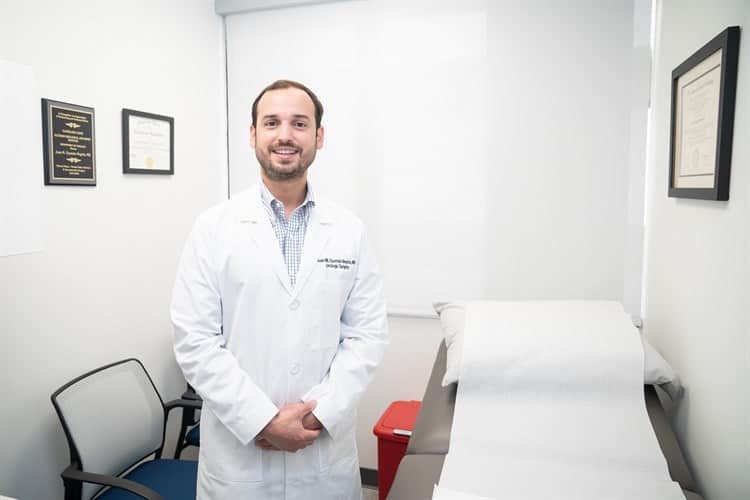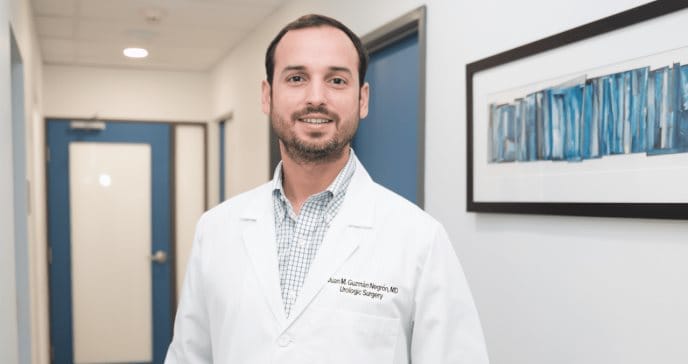“We are here to help patients,” he stresses.
Doctor Juan Guzmán Negrón, urologist specialized in female urology and reconstructive surgery on the female pelvic floor.
Dr. Juan Guzmán Negrón is a renowned urologist who has specialized in female urology and reconstructive surgery on the female pelvic floor. The family, the nostalgia and the desire to return to his loved ones, was what made him return from Florida, United States, to Puerto Rico, in addition to the commitment he assumed with himself, regarding fulfilling the responsibility of serving the population puerto rican
A very happy childhood, but marked by bronchial asthma
Looking back, Dr. Guzmán affirms that he had a very happy childhood, surrounded by his family, practicing sports, playing tennis, basketball, and other disciplines. Over time, weekdays were dedicated to his work, but weekends were always reserved for his family and the pleasant company of his two brothers.
Guzmán remembers having suffered from bronchial asthma, but far from being a disabling disease, this became an opportunity that led him to approach the world of medicine.
Regarding his influences to choose a medical career, the first thing that inclined him was his asthmatic condition, since he loved to exercise, but he was forced to go to the doctors to treat asthma, so he saw his pediatrician as a role model, always willing to treat him kindly when he felt sick, which left a good impression on him, and over the years he wanted to pursue a medical degree to also emulate what the pediatrician had done for him.
“All women should know that they are not alone,” says the doctor.
In the company of his wife and his pet
At this time, Guzmán is in the company of his wife and their pet, who is also considered part of the family. Regarding his personal plans, one of them is to increase the number of members in the family, since for now he and his partner have not conceived.
Regarding the sad moments in his life, Dr. Guzmán was very affected by the death of his father, a very hard moment, as was the death of his grandfather; two events that he considers have marked him forever. Well, even if you think you’re ready, he never is.
Professional challenges
In the professional field, he has encountered challenges, but as he studies, he updates his knowledge and has advanced in his career.
The days that he considers the happiest in his life have been those in which he has been surrounded by his family and his closest friends; His family is the pillar that gives him the greatest joy.
Professionally, his days begin with a little exercise in the morning; he chooses this moment because he does not know at what time his working day will end. Then, you come to the office, see patients, and the day is spent seeing people. Your day ends at around 4 p.m., but between closing entries, it can also end at 7 p.m.
Finally, he arrives at the house to have dinner, share with his family and rest. If it is a day in the operating room, the day starts much earlier, since it arrives at the operating room and the exit depends on the complexity of the processes.

The doctor loves his profession and his country.
The difference between female urology and gynecology
A urologist specializing in female pelvic medicine shares with the gynecologist specialists; but, the specialized urologist is more apt to treat more complex conditions of the female genital tract; since his training is two or three additional years. Inside of gynecology there is also a subspecialty that does training similar to female urology.
A woman should visit a specialized urologist for multiple reasons, including: bleeding in the urine, recurrent urine infections, kidney stones, urinary incontinence (overactive or stress-related bladder), pelvic prolapse, among others, since this is a specialist who has trained for more years and can treat complex conditions, since they are conditions that affect the quality of life of the patient.
Among the most frequent causes in Puerto Rico for which women go to a specialist in female urology are urinary incontinence, prolapse problems of the pelvic organs, urinary fistulas, in the bladder or in the urethra.
The treatments used depend on the condition that the woman presents. If medications don’t work, there are other newer options that can be used that are minimally invasive.
All women should know that they are not alone, but that they are accompanied and have the support of doctors committed to their profession, such as Dr. Guzmán.
–

